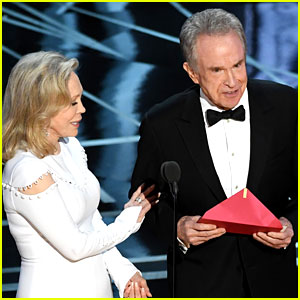 Everybody makes mistakes, right? And often times, these mistakes are minor and no one notices, or, we are able to fix them before anyone does notice. But then there are times where mistakes are made on a grand scale, or should I say, the grand stage. At this past Sunday’s 89th Academy Awards ceremony, a pretty big mistake happened to close out the show. Warren Beatty and Faye Dunaway were handed the wrong envelope while announcing the winner of Best Picture. Instead of a card with Moonlight written on it, they were handed the card for the previously announced winner of Best Actress Emma Stone for La La Land. Beatty froze, unsure of what to do. He showed the card to Dunaway, who incorrectly announced La La Land as the winner of Best Picture. As the speeches were concluding, the error was corrected, the award was taken away from La La Land and presented to Moonlight. All parties involved were very gracious, and handled themselves quite well in such an awkward situation. While there are a lot of moving parts, and lots of logistics to handle, it makes one wonder how such a mistake can happen. It turns out the two PwC accountants (who I will not name here) responsible for handing over the wrong envelope were distracted backstage, and as a result, caused quite the flub. As a result, both of them have been permanently removed from all film academy dealings. I’m guessing it’s not exactly how they saw their night ending.
Everybody makes mistakes, right? And often times, these mistakes are minor and no one notices, or, we are able to fix them before anyone does notice. But then there are times where mistakes are made on a grand scale, or should I say, the grand stage. At this past Sunday’s 89th Academy Awards ceremony, a pretty big mistake happened to close out the show. Warren Beatty and Faye Dunaway were handed the wrong envelope while announcing the winner of Best Picture. Instead of a card with Moonlight written on it, they were handed the card for the previously announced winner of Best Actress Emma Stone for La La Land. Beatty froze, unsure of what to do. He showed the card to Dunaway, who incorrectly announced La La Land as the winner of Best Picture. As the speeches were concluding, the error was corrected, the award was taken away from La La Land and presented to Moonlight. All parties involved were very gracious, and handled themselves quite well in such an awkward situation. While there are a lot of moving parts, and lots of logistics to handle, it makes one wonder how such a mistake can happen. It turns out the two PwC accountants (who I will not name here) responsible for handing over the wrong envelope were distracted backstage, and as a result, caused quite the flub. As a result, both of them have been permanently removed from all film academy dealings. I’m guessing it’s not exactly how they saw their night ending.
And now, on to the news.
- Apparel titan VF Corp tackles deforestation, human rights issues in supply chain
- Another startup enters autonomous truck market
- Mexico warns it will cut off NAFTA talks
- Amazon aims to deliver food from India’s farms
- DHL trials city hub trailer for bike delivery
- Spot freight volume up slightly
 VF Corp, the apparel giant behind brands such as Wrangler jeans, Timberland boots, The North Face, Lee jeans, Vans shoes, Nautica fashion, and others, is adopting new policies within its supply chain that have a drastic social impact. Specifically, the company is focusing on its policies towards eliminating deforestation and human rights issues within its supply chain. The new policies will affect its sourcing of wood pulp, which is used in packaging. The company said it plans to eliminate the sourcing of products that contribute to the loss of forests or rights of indigenous people and local communities. VF Corp is hoping to eliminate these products from its supply chain by the end of 2017, and joins a host of other companies with similar interests, including L Brands, Ralph Lauren, H&M, Zara, Levi Strauss & Co, and Stella McCartney.
VF Corp, the apparel giant behind brands such as Wrangler jeans, Timberland boots, The North Face, Lee jeans, Vans shoes, Nautica fashion, and others, is adopting new policies within its supply chain that have a drastic social impact. Specifically, the company is focusing on its policies towards eliminating deforestation and human rights issues within its supply chain. The new policies will affect its sourcing of wood pulp, which is used in packaging. The company said it plans to eliminate the sourcing of products that contribute to the loss of forests or rights of indigenous people and local communities. VF Corp is hoping to eliminate these products from its supply chain by the end of 2017, and joins a host of other companies with similar interests, including L Brands, Ralph Lauren, H&M, Zara, Levi Strauss & Co, and Stella McCartney.
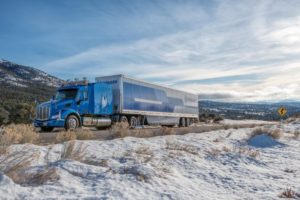 A new California-based start-up, Embark, is entering the autonomous trucking world. Embark is developing a retrofit system for existing trucks. According to Alex Rodrigues, the company’s co-founder, the cost to deploy the trucks should be less than $50,000. The company unveiled its self-driving trucks late last week, using a combination of retrofit radars, cameras, and LiDAR depth sensors. Embark has completed more than 10,000 miles of testing with its fleet of five trucks and received its test license in the State of Nevada in late January.
A new California-based start-up, Embark, is entering the autonomous trucking world. Embark is developing a retrofit system for existing trucks. According to Alex Rodrigues, the company’s co-founder, the cost to deploy the trucks should be less than $50,000. The company unveiled its self-driving trucks late last week, using a combination of retrofit radars, cameras, and LiDAR depth sensors. Embark has completed more than 10,000 miles of testing with its fleet of five trucks and received its test license in the State of Nevada in late January.
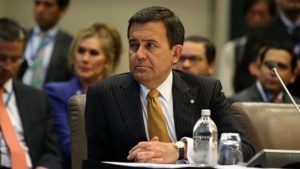 Citing concerns over President Trump’s proposed tariffs, Mexico’s top trade negotiator has warned that the country will break off talks to rework NAFTA. Mexican Economy Minister Ildefonso Guajardo has said that Mexico will walk away from any talks if the US decides to apply any duties or quotas on any products from south of the border. However, these statements do not mean that Mexico is about to walk away from NAFTA. Instead, the country refuses to discuss the kinds of tariffs that have been proposed. Mexican officials have said they expect official talks to start in June.
Citing concerns over President Trump’s proposed tariffs, Mexico’s top trade negotiator has warned that the country will break off talks to rework NAFTA. Mexican Economy Minister Ildefonso Guajardo has said that Mexico will walk away from any talks if the US decides to apply any duties or quotas on any products from south of the border. However, these statements do not mean that Mexico is about to walk away from NAFTA. Instead, the country refuses to discuss the kinds of tariffs that have been proposed. Mexican officials have said they expect official talks to start in June.
“The moment that they say, ‘We’re going to put a 20% tariff on cars,’ I get up from the table. Bye-bye.”
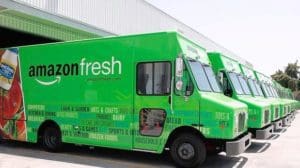 Amazon is awaiting FDI approval to deliver groceries in India. Specifically, the company is gearing up to start selling farm produce, lentils, and milk in India once it receives the government’s approval for its wholly-owned foods unit. While Amazon already sells fresh vegetables, fruits, and dairy products through its hyperlocal venture Amazon Now in Mumbai, Delhi, Hyderabad and Bengaluru, these products are all sourced from supermarkets. The new venture guarantees fresh produce from farms can be delivered to consumers. It is yet another way Amazon is seeking to remain innovative in a crowded delivery environment.
Amazon is awaiting FDI approval to deliver groceries in India. Specifically, the company is gearing up to start selling farm produce, lentils, and milk in India once it receives the government’s approval for its wholly-owned foods unit. While Amazon already sells fresh vegetables, fruits, and dairy products through its hyperlocal venture Amazon Now in Mumbai, Delhi, Hyderabad and Bengaluru, these products are all sourced from supermarkets. The new venture guarantees fresh produce from farms can be delivered to consumers. It is yet another way Amazon is seeking to remain innovative in a crowded delivery environment.
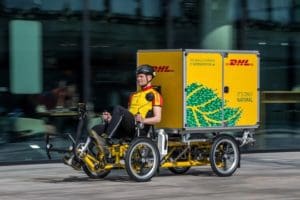 DHL is set to trial a new “city hub” trailer as part of its bicycle delivery program. The trailer has been customized to carry up to four containers worth of goods for the company’s cargo bicycles. The program requires a DHL van to transport the trailer into a city center, then load it up onto the bicycle for last mile deliveries. The bicycle is able to carry a container with a load of up to 275 pounds. The bicycle program allows DHL to deliver in crowded cities while eliminating carbon emissions, a topic that is top of mind for many companies right now. Additionally, the bicycles are able to bypass traffic congestion, and deliver more orders in crowded areas. According to DHL Express, each of the hubs replaces up to two standard delivery vans.
DHL is set to trial a new “city hub” trailer as part of its bicycle delivery program. The trailer has been customized to carry up to four containers worth of goods for the company’s cargo bicycles. The program requires a DHL van to transport the trailer into a city center, then load it up onto the bicycle for last mile deliveries. The bicycle is able to carry a container with a load of up to 275 pounds. The bicycle program allows DHL to deliver in crowded cities while eliminating carbon emissions, a topic that is top of mind for many companies right now. Additionally, the bicycles are able to bypass traffic congestion, and deliver more orders in crowded areas. According to DHL Express, each of the hubs replaces up to two standard delivery vans.
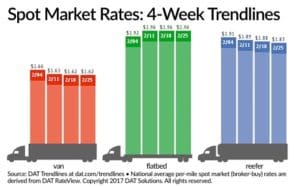 And finally, the spot freight market is up slightly over the last few weeks (and up 100% over last year), according to DAT Solutions and its network of load boards. The gain over the last few weeks is mostly due to a 7% gain in flatbed loads; van and refrigerated freight posts declined 5% and 6%, respectively. This week’s load-to-truck ratios were: van ratio: 2.3 available loads per truck; reefer ratio: 4.4 available loads per truck; and flatbed ratio: 29 available loads per truck.
And finally, the spot freight market is up slightly over the last few weeks (and up 100% over last year), according to DAT Solutions and its network of load boards. The gain over the last few weeks is mostly due to a 7% gain in flatbed loads; van and refrigerated freight posts declined 5% and 6%, respectively. This week’s load-to-truck ratios were: van ratio: 2.3 available loads per truck; reefer ratio: 4.4 available loads per truck; and flatbed ratio: 29 available loads per truck.
That’s all for this week. Enjoy the weekend, and the song of the week, Sheryl Crow’s My Favorite Mistake.

















